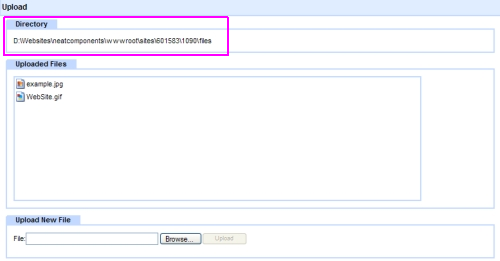 |
clearString neatComponents
|
|
clearString neatComponents Upload |
 | ||
 | Reference |  |
Upload | ||
 |  |

The Upload component allows files to be uploaded to the server.

It is very similar to the uploading capability provided elsewhere in the system for uploading images, files, etc for the Text Editor, or for Table image and file fields, however those other capabilities are designed for uploading items for control by the neatComponents system once they are uploaded. This means, for example, that with those systems the location the files are uploaded to can change as the system manages version control.
Upload directory
For security reasons the Upload component choses its own location where uploaded files are stored. Otherwise, executables could be uploaded to the server or system files overwritten.
The file location - highlighted below - is used to reference the component.

A Permission allows you to choose whether the upload location is displayed to to the user or hidden.
Viewing of uploaded files
A Permissions controls whether the user can view files already uploaded. If they can, they can right-click on one, and Delete it, or Open it.
Referencing the uploaded files
The uploaded files are held in a folder in the path shown under Directory (indicated above).
For example:
C:\Program Files (x86)\Enstar\neatComponents\wwwroot\sites\10494\40\files
To link to a file in this Upload Directory simply create a relative path with two dots .. and flip the slash from \ to /, thus
../40/files/
For example:
<source src="../40/files/example.jpg" />
Typical uses
The Upload component is useful as part of integration solutions, where you need to allow (suitably logged-in users) to upload files to the server for later processing, for example as part of a batch import process. It is used to upload jQuery .js and .css files.
It can also be used as a light-weight stand-alone function to enable people to share files, however it does not record who uploaded the files, nor does it provide any opportunity to store meta-data alongside the files.
For those capabilities, use a Table with a field of the File datatype.
Copyright © 2026 Enstar LLC All rights reserved |
